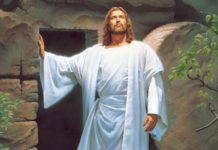
The following article is an excerpt from The Hero Doctrine by Neal Silvester.
In the story of Star Wars, Luke Skywalker started out as a moisture farmer on the barren planet of Tatooine and ended as a key player in the rebellion against the evil Empire, gradually transforming from an ordinary soul into the epitome of a classical hero.
The general arc of this transformation is called the Hero’s Cycle, a literary and mythological concept first formed by Joseph Campbell, author of The Hero with a Thousand Faces. There’s another arc I’d like to talk about that is similar but far more significant. I call it the Eternal Arc. It parallels the Hero’s Cycle with startling precision. Just as Luke unknowingly progressed through the various stages of character development in his unconscious quest to become a hero, so must we advance through different stages of existence and states of being in our conscious quest to join Heavenly Father in all His glory and domain.
A Hero Is Born
The end goal of our existence is to inherit a station and glory like that of our Heavenly Father. First, we must become like Christ in traits and attributes, and then we may become like Heavenly Father in glory and stewardship. That is the grand destination at the end of our journey.
Journeys, of course, need maps. We need to know where we are going to go and which paths we need to take on our way to the end.
Luke Skywalker didn’t have a map to chart his personal journey, but we do. We call that map the plan of salvation, otherwise called the plan of happiness. The plan takes us from ordinary peasants, busy with the daily doldrums of mortal toil, to spiritual kings and queens, heroes and rulers in our own kingdoms—from blurry-eyed intelligences all the way to exaltation and eternal life as heirs in the presence of God.
Just as we have an eternal future, so too do we have an eternal past, an existence before Heavenly Father even clothed us in spiritual form. As mere intelligences, we had only the most basic of identities, with potential we perhaps didn’t understand. This is the state Luke began in, unaware of his destiny but looking up at the stars, wanting to join them and be a part of higher life, even if he didn’t know what that would be.
In Luke Skywalker, we see a mirror of our own potential.
The Call to Adventure
The Hero’s Cycle always begins with a rousing cry. The character is figuratively awoken and called upon to put foot to the path for a special mission or duty that will eventually carry him or her away to a transformative adventure.
Luke was roused from his state of mediocrity by a literal call for help. The message came in the form of C-3PO and R2-D2, droids who possessed a recording from Princess Leia asking for help from whoever got the message. This was Luke’s “Call to Adventure”—the first opportunity to show his true potential.
Likewise, our first step in the Eternal Arc was our own “Call to Adventure,” the love of a God who showed us what we could one day be: a being like Him. He brought us out of our ethereal existence and gave us more sharply defined identity through spirit and gender.
Crossing the Threshold
The stage of “Crossing the Threshold” refers to the moment when, no matter what the decision, the would-be hero can never turn back. For Luke and many other heroes, the threshold is the moment when the first call to action is refused. Luke felt the initial weight of destiny on his shoulders but responded with fear and uncertainty, and so refused the call. It wasn’t until Luke learned that the Empire killed his aunt and uncle that he accepted Obi-Wan’s invitation to train as a Jedi.
In pre-earth life, we too made certain choices, but unlike Luke, we did not refuse our initial call. We kept our first estate and stewardship, choosing to heed Heavenly Father’s call the first time it was offered. This choice allowed us to be sent to earth and be given bodies, the next essential phase of being in our Eternal Arc and our second great stewardship or estate.
This decision to come to earth was a decision we can never take back.
Mentor
The mentor figure is an essential part of the hero’s development, for it is through the mentor that the hero perceives the greater goal. Luke had Obi-Wan Kenobi, who taught him the basics of fighting and revealed to him his true potential—to be a Jedi knight, like his father.
Similarly, we have mentors everywhere in our lives. Ideally, they teach us to navigate the world, make good choices, and, like Obi-Wan, remind us of our true potential to become like our progenitors. These are the prophets, scriptures, priesthood leaders, and, more especially, earthly parents. From them and the gift of the Holy Ghost, we learn our true parentage, and thus our true identity and destiny.
Without guides, without anyone teaching us truth and training us, we would not be responsible for poor choices—we would not know any better, leaving us ignorant and stunted. With guides, with the Holy Ghost, we become responsible and accountable for our actions, therefore becoming full agents, just like our Heavenly Father.
The Road of Trials
Luke faced many a peril in his quest to save the princess. Threatened by death at every turn, Luke learned the dangers of the world firsthand, but he also learned how to react to them. From the adversity provided by the stormtroopers and Darth Vader, and the guidance given by Obi-Wan in learning the Force, he eventually learned to fight on his own—even to become a leader of other heroic warriors.
He had yet to face his greatest challenge, though: confronting Darth Vader, who he came to learn was his morally fallen father, and finally the Emperor himself. This was not a test of skill with the lightsaber but rather a spiritual battle, a trial of temptations. The evil Emperor, in his satanic role, sought to corrupt Luke’s soul and bring him over to the dark side. After feeling the pressure of evil within him, Luke fought hard and won out, remembering the hero his father once was and wanting to be just as good. In making that choice, Luke took the final step in his journey and became a full-fledged hero.
The hero-in-training must always face temptations, which are more realistic confrontations with evil than a mere test of swordplay. Like Luke, if in the midst of our temptations we remember our Father and our potential to become like Him, the strength of those temptations will lose their sting.
Death and Rebirth—Transformation
While Luke’s works were good, even great, in defeating his enemies and bringing the galaxy closer to freedom, Luke himself became something great, someone who fulfilled his potential. He even saved his father’s soul, wrenching it from the Emperor’s grasp and returning it to the side of good. From farm boy to hero to even savior, that is the transformation process of the Hero’s Cycle, and it is the essence of the Hero Doctrine.
As we strive towards Christlike behavior, we cast off the natural man and integrate the roots of our divine heritage into our whole soul. We begin to be concerned for the welfare of others, both spiritually and temporally. We begin to see the world, God, and our neighbors with a spiritual lens, or an eternal perspective. And we begin to feel love and become a source of love in a way that is not possible without Christ’s influence.
But that is not the end. Beings Christlike is only the first half of our transformation. The second is becoming like Heavenly Father.
Atonement with the Father
The transformation process takes the hero to a certain stage that resonates so loudly with our theology that it almost needs no explanation. After all, what else could “Atonement with the Father” really mean?
Recall Luke’s ambition to become a Jedi, like his father before him. After becoming a full soul, with spirit and body, we are asked to go about perfecting that fused being and become like the Father by rejecting all ungodliness denying the carnal nature inherent in mortal bodies and choosing the divine nature inherent in our spiritual bodies. This is where we open up to our Father in Heaven and let His power perfect us. Oneness with the Father—eternal life in His presence and the eternal life that He Himself lives—is what the Atonement is all about: God granting us power and increase we would not be capable of producing ourselves.
For the power and heritage of God to be expressed in our lives, faith and the lens of the Spirit are required; we must stop depending on our own eyes and strength and start trusting in His. This is what Luke did during the Death Star attack, when he disregarded the computer’s targeting system and put his trust in an unseen higher power. Only with the added measure of the Force and the spiritual vision Luke received could he hit that two-meter exhaust port and destroy the Death Star.
Ultimate Boon
The never-ending inheritance and happiness we’re promised, is our “ultimate Boon”—a veritable Holy Grail, what we’ve been working on and searching for all this time.
For Luke, it was peace within himself—peace as he rejected the dark side and as he saved his father’s fallen soul; peace as he grew to his full potential and realized the Jedi he became; peace as he destroyed the evil in the galaxy, ended the war decisively, and set the prisoners free. In the end, Luke fully realized his destiny, potential, and power.
It is after we receive of the ordinances of the gospel, show our faith in Christ a repent of our sins, and live righteously to the ends or mortality and endure to the end—all steps and stages of the Eternal Arc—that we can advance to our highest state of being: exaltation.
Supreme happiness and love is the true meaning of the word heaven. Sealed to your birth family, your companion, and your children “to receive a greater change, and to be received into the kingdom of the Father to go no more out, but to dwell with God eternally in the heavens” (3 Nephi 28:40) — this is where you will learn sacred powers, create worlds, and tell new stories by knowing all things, doing all things, and having all things.
Freedom to Live
The last stage of the hero’s journey is liberation. With the Death Star destroyed and the Empire in shambles, Luke could now live his life freely, without fear or enemies. Neither his past nor his future was bound.
But ponder the consequences if Luke had remained with his aunt and uncle, farming moisture out of a barren wasteland of a planet—what a parable for our modern-day distractions! Meandering through hoops and further down the Facebook feed, employing ourselves primarily in video games and putting all our resources and time into merely seeking to gain more and more money and more and more things that fall away from us as we rise into the next world—though flashy and colorful, this kind of living leaves our book of life as empty and dull as Tattooine.
We have a destiny far grander than that. It is Satan’s victory if we forget it, disregard it, or treat it as dross. Just as a car sitting at a stoplight needs the gas pedal to be pressed to make it move, so are exertion and effort required for any journey. Without any input, we will sit there idly, never going anywhere, forsaking our inheritance for a figurative mess of pottage—for worldly pleasures and distractions—a fate our Father never wants us to resign ourselves to.
This is what we were born to be: kings and queens. Rulers. Creators. We are children of the Most High, heirs to a heavenly throne. Remember that when you say the things you say and do the things you do. But remember most of all that, unlike Luke Skywalker, in God’s kingdom, there is no limit to your arc, no true end to your story.





